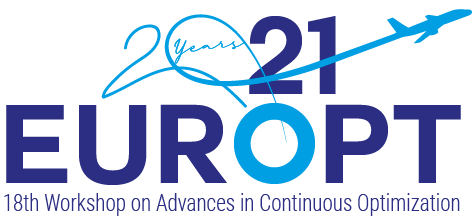TE-01: Optimization and Artificial Intelligence I
Stream: Optimization and Artificial Intelligence
Room: Fermat
Chair(s): Fabian Bastin
Exploiting Sparse Decision Trees To Learn Minimal Rules
Tommaso Aldinucci
Decision tree algorithms have been one of the most famous and used algorithms in machine learning since the early 1980’s. Given their intrinsic explainability, nowadays they are widely used in contexts where transparency is desired. In this work we propose a new heuristic strategy to extract minimal rules from decision trees. At first the algorithm builds a sparse structure then uses a local optimizer to improve the quality of the tree. We finally show that the rule set extracted from the final model can be often simplified using elementary rules of boolean logic.
Improved Forward Selection Algorithms for Sparse Principal Component Analysis
Mustafa Pinar
Sparse PCA is a well-known NP-Hard problem where the principal components obtained are desired to be sparse. This is useful in various studies due to its interpretability and robustness. In literature, heuristics or SDP relaxations are used to solve this problem. In this study, we propose multiple novel heuristics using eigenvalue approximation such as Gershgorin Circle’s to improve the performance of greedy forward selection methods. We have observed that our methods perform better in under-determined and high dimensional settings compared to the existent methods in the literature.
Kernel Regression with Hard Shape Constraints
Pierre-Cyril Aubin
Regression problems typically involve shape constraints due to qualitative priors or physical constraints, such as positivity or monotonicity. This writes as an infinite number of pointwise inequalities. Dealing with reproducing kernel Hilbert spaces, I describe how to solve a strengthened problem with a finite number of second-order cone constraints with bound guarantees, and application to joint quantile regression, to Engel’s law and to analyze vehicle trajectories. This approach is extended to linear-quadratic optimal control problems with state constraints.
Leveraging deep reinforcement learning through the framework of operations research
Ysaël Desage, Fabian Bastin, François Bouffard
While research in the field of artificial intelligence has been booming in recent year, especially in the field of machine learning, most applications are still in their infancy. In this perspective, we propose a hybrid innovative approach combining the performance and neologism of deep reinforcement learning with the reliable empirical and proven application framework of classical operations research. More concretely, we detail the proposed methodology before presenting the results on different problems and sub instances related to the power grid and the optimization of its actors.
